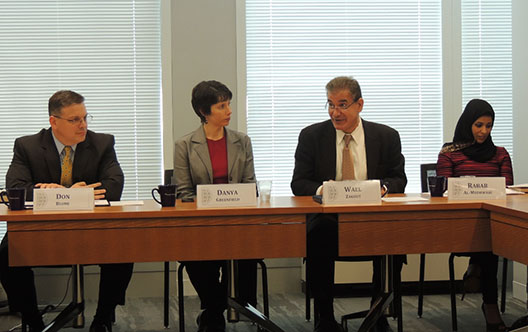 Two months after Yemen’s National Dialogue Conferences concluded, many questions remain about how the next steps in the transition and the guarantees produced by the Dialogue will be implemented. In a country where half of the population lives below the poverty line, economic issues are of particular concern. On April 8, the Rafik Hariri Center for the Middle East hosted a discussion on these issues with US Department of State office director for Arabian Peninsula Affairs Don Blome, World Bank Country Manager for Yemen Wael Zakout, and National Democratic Institute Senior Program Manager in Yemen Rabab Al-Medhwahi. Hariri Center Acting Director Danya Greenfield moderated the conversation.
Two months after Yemen’s National Dialogue Conferences concluded, many questions remain about how the next steps in the transition and the guarantees produced by the Dialogue will be implemented. In a country where half of the population lives below the poverty line, economic issues are of particular concern. On April 8, the Rafik Hariri Center for the Middle East hosted a discussion on these issues with US Department of State office director for Arabian Peninsula Affairs Don Blome, World Bank Country Manager for Yemen Wael Zakout, and National Democratic Institute Senior Program Manager in Yemen Rabab Al-Medhwahi. Hariri Center Acting Director Danya Greenfield moderated the conversation.
During the discussion, there was strong emphasis on the progress that Yemen has made: the country has held together since the 2011 uprising rather than spiraling into widespread violence; the National Dialogue was inclusive and concluded successfully; and the next steps in the transition—including constitution-drafting, a referendum, and elections—are proceeding apace. However, ongoing security problems such as attacks on security forces and pipeline sabotage continue to destabilize the country and debilitate the economy; likewise, the Houthi rebellion in the north and the Herak secessionist movement in the south are serious challenges for the government.
The discussion also touched on growing differences among political parties on how quickly the constitution should be drafted and how soon the constitutional referendum should be held, with President Hadi and others advocating for a compressed timeline of six months even though the biometric election registry will not be ready that soon. Another key issue addressed was how the new federal system, which will divide Yemen into six regions, will be implemented. The short term challenges include Houthi and southern secessionist opposition to the plan and the long term issues that must be addressed include determining how each region will receive funding; the distribution of power at the local, regional, and national level; and mechanisms for addressing disagreements between regional authorities and national authorities.
Since the United Nations, the United States, the Gulf States, and international financial institutions have played a leading role in midwifing and shepherding Yemen’s transition, the discussion also addressed ways that these actors can continue to support the process. Suggestions for areas of cooperation included supporting the new regional level of government rather than continuing to work solely with the central government, assisting with the voter registration and elections processes, focusing on institution building in the government rather than prioritizing security assistance, and encouraging international donors to invest in projects that will create growth and jobs in the short term.
